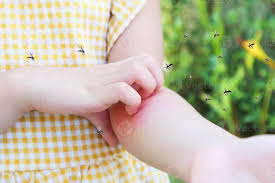Mosquito bites are notorious for causing discomfort, including itching, redness, and swelling. However, in some cases, mosquito bites can trigger a more significant skin reaction known as hives, or urticaria. In this informative blog post, we will delve into the relationship between mosquito bites and hives, exploring the causes, symptoms, and management of this skin condition.
-
Understanding Hives: Hives, or urticaria, are characterized by the sudden appearance of raised, itchy, and often red welts on the skin. These welts can vary in size and shape and may change in location and intensity over time. Hives are typically the result of an allergic or immune system response.
-
Allergic Reactions to Mosquito Bites: While most people experience minor localized reactions to mosquito bites, such as redness and itching, some individuals may have a more pronounced immune response. In these cases, the immune system releases histamines and other chemicals in response to mosquito saliva, leading to an allergic reaction that can manifest as hives.
-
Mechanism of Mosquito Bite-Induced Hives: When a mosquito bites, it injects saliva into the skin to facilitate blood flow. For individuals prone to allergic reactions, the immune system may recognize specific proteins in the mosquito saliva as foreign substances, triggering the release of histamines. These histamines cause blood vessels to dilate and fluid to leak into the surrounding tissues, resulting in the characteristic hives.
-
Symptoms of Mosquito Bite-Induced Hives: The symptoms of mosquito bite-induced hives are similar to those caused by other allergens. They include:
- Raised, itchy welts or patches on the skin
- Redness and swelling
- The welts may change in size and shape, and new ones may appear
- The hives can migrate to different areas of the body
- Management and Treatment: If you develop hives after mosquito bites, there are several steps you can take to manage the symptoms:
- Avoid scratching the hives, as it can exacerbate the itching and potentially lead to skin damage or infection.
- Apply cold compresses or take cool showers to soothe the affected areas and reduce inflammation.
- Over-the-counter antihistamines can help alleviate itching and reduce the immune system's response.
- Topical corticosteroid creams or ointments may be recommended by a healthcare professional to reduce inflammation and itchiness.
- In severe cases or if hives are accompanied by other symptoms, such as difficulty breathing or swelling of the face or throat, seek immediate medical attention.
- Prevention: Preventing mosquito bites is key to minimizing the risk of hives and other mosquito-borne reactions. Use the following preventive measures:
- Wear protective clothing, such as long sleeves and pants, when in mosquito-prone areas.
- Use mosquito repellents containing DEET, picaridin, or other recommended ingredients.
- Maintain a regular spray schedule around your home to keep mosquitos away.
- Avoid outdoor activities during peak mosquito activity times, such as dawn and dusk.
- Keep windows and doors screened to prevent mosquitoes from entering indoor spaces.
While most mosquito bites result in mild localized reactions, some individuals may experience hives as an allergic response. Understanding the relationship between mosquito bites and hives can help individuals recognize and manage this skin condition effectively. By taking preventive measures, practicing proper bite care, and seeking medical advice when needed, individuals can minimize the discomfort and impact of mosquito bite-induced hives.










